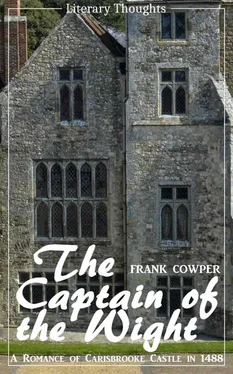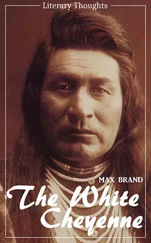"Well, fair son, thou hast answered as I would have thee. 'Tis sad to thy lady mother and me to part with thee, even for a space, but it is thy life that must be spent, not ours, and we have ever thought on thy weal. I will take thought what can be determined to try purveyance and maintenance as befitteth a son of the De Lisles. And now, son Walter, what willest thou?"
Walter was a delicate, slight boy, with a studious face, and one who had always been looked upon as the scholar of the family. He knew well what his parents wished, and also what was the custom of those of gentle blood who were the youngest sons. They must either seek their fortune in war, or else in the Church. He had not physical strength, nor sufficiently combative instincts, for the profession of arms, although, boylike, he had often been led away, when reading the romances of the time, to wish to imitate the deeds of Roland, or Tristram, or Launcelot; but then he was very fond of their worthy chaplain, who was also the boys' tutor, and he had been strongly imbued with a desire to sacrifice himself to God, as it was called. He therefore answered,--
"Father, I would like much to be a clerk, and follow in the steps of Our Lord and Master. Perchance I may do some good work some day."
"Ay, in sooth wilt thou, my dear son; and thou hast made the choice most after thy mother's heart, albeit, weak man that I am, had I been a youth, I would have thought scorn of a clerkly life, yet, now I am old, I know well what awaiteth those who have devoted themselves to God and Mother Church from their youth upward. I will avise me what hath best be done for thee also, and will send a missive to my right reverend kinsman the Abbot of Quarr, and perchance he will do his best to help us. And now, my sons, since all is in fair trim for your future welfare, and thy noble and fair mother is right pleased, I know, as truly am I--and I give God thanks that He hath given me such right trusty and well-nurtured sons--let us all go to supper, for we have even to drink the health of our Ralph, who by God's will from henceforth will soon become a right honest varlet and trusty page, and in time will proceed to be a very worshipful knight, like his ancestors have been--worthy men, and leal to their liege lord."
So saying, the old knight rose up with difficulty, assisted by his sons, who ran to aid him, for he had received a severe wound from a bill, over his left thigh, and had never recovered the use of it since.
"Grammercy, fair sons! but, Ralph, do thou lead in thy lady mother, for to thee belongs the honour of the day."
And so the little party went down the passage and entered the hall, where supper was laid at the upper end. The servants were all assembled in the body of the hall, and the sons carved for their parents at the high table. Ralph's health was duly drunk amid much festivity, and the whole household retired to rest at a reasonable hour.
The next day a messenger was despatched to Salisbury, where the Abbot of Quarr, who was related to Sir John Lisle, or De Lysle, was staying, to ask him to come over to Thruxton Hall, and advise his kinsman on the future of his sons. The worthy Abbot came without delay; and that evening a family consultation was held in the old parlour, round the knight's armchair.
The old knight briefly explained the matter, and then left the worthy Abbot to comment on it.
"By the Holy Rood! but thy gentle sons have all well bethought them, and I could not have directed them better myself. Truly, 'tis the overruling spirit of God who has guided them to a right judgment!" said the Abbot. "Now for Jasper there will need to be no thought taken. Out of the abundance of thy lands he will be provided for, and may marry and raise up a fair lineage; but for our nephew Ralph other thoughts will be requisite. He will need fair clothes, as becometh one of a noble house, and an honest varlet to go with him, and a mettlesome courser; one not too fiery, that will lead him astray, and perchance disgrace him, or his clothes, but one that is stout withal, and not of a too tame spirit. And now methinks I know of just such a one, which the Prior of Christchurch, who is at Sarum now on business, wisheth to part with, having become too feeble or too stout for so mettlesome a nag. Nephew Ralph, I will e'en give him thee, with my blessing."
"My Lord Abbot, I give thee humble thanks," stammered Ralph delighted.
"And now we must bethink us to what noble lord we may apprentice him. Thou knowest what state my Lord Scales, lately deceased, kept in his Castle of Carisbrooke. He, poor man--and may the Lord have mercy on his soul--was grievously done to death near Stoney Stratford, by the late King Richard, whom the devil led far astray. Nevertheless, he was a man of war, and well skilled in subtle council. However, King Henry hath made his brother Captain-General of our land; and Sir Edward Woodville, whom most men call the Lord Woodville, and who some even think will be called to the council by the style of Lord Rivers, is but now on his way back from the hard fight at Stoke by Newark, where he hath gained himself fresh glory. Certes he is a gallant, very puissant, and right hardy lord, and one under whom much knighthood and gentleness might be learnt, and as he is the uncle of our sovereign lord the King's most noble wife, there is much hope Ralph might be advanced in the King's household. Now I can present our fair nephew to him, and he can be brought up under my eye in the right pleasant Castle of Carisbrooke, of the honour of which the Lisles hold the Manor of Mansbridge. How say you, kinsman mine, will this serve you?"
"Ay, marry will it, my Lord Abbot, and I see fair promise of the boy's doing well, and faring right puissantly. And now I bethink me, our kinsman of Briddlesford may take an interest in the lad. His own son, I hear, hath been disinherited by him for his wilfulness and strong fealty to the house of York. I would fain see them reconciled, but an that may not be, I see no wrong in Ralph marrying his only daughter. But now, canst thou do somewhat also for son Walter here?--he would like well to be a clerk."
"By Our Lady, but he is a good lad, and we will take order that he be well advanced, as far as our poor influence in the Holy Church goeth; but he should be entered at Oxen ford shortly, for he is of age to go thither. I will write to my well-beloved brother and kinsman, the Abbot of Abyngdon, who will get him entered at Queen's College, over which, when I was a scholar, the very puissant prince Cardinal Beaufort was provost."
Thus the future of the boy was well arranged, and it was agreed that the Abbot of Quarr should take Ralph with him, as soon as his outfit was ready; and in order to expedite matters, a serving-man was sent to Salisbury to fetch out a tailor with the necessary cloth and stuff suitable to apparel a young man of good birth who was going to be page to so potent a lord as the Lord Woodville. At the same time, the varlet received orders to negotiate with the Prior of Christchurch for the horse.
Meanwhile Ralph and his brother had tried the qualities of his new hawk.
"Thou well knowest, brother Ralph," said Jasper to him, as they rode along on their small ponies towards Chute Forest, "my peregrine will fly faster than thy gerfalcon."
"Marry, will it? that we shall see, I trow. See there's a bird yonder; 'tis a heron, now fly our birds at her."
No sooner said than done; off went the jesses, away went the hoods, and with a swing of the arm and wrist, the noble birds were cast off the fist. Up they sprang high in air. The gerfalcon mounted quicker, but the peregrine went straighter. Away they sped and the boys after them, halloing to the dogs to keep to heel.
"See, Ralph, I told thee so, thy bird can't hold a candle to mine. Well flown, Swiftwing, well mounted! Now she sees the quarry!"
Читать дальше












